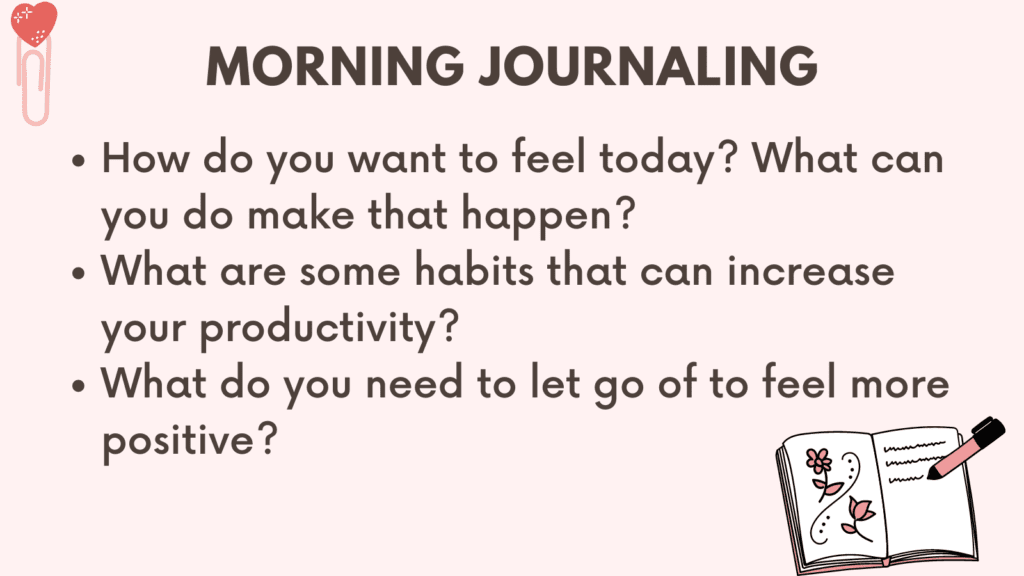This post contains some of the best new month journal prompts for adults.
What Are Journal Prompts?
Journal prompts are thought-provoking questions or writing prompts that help inspire and guide you in your journaling practice.
They encourage self-reflection, creativity, and personal growth. Journal prompts can be specific or open-ended, and they can cover a wide range of topics such as gratitude, personal goals, relationships, emotions, and more.
Writing in response to journal prompts can help you gain insights into your thoughts, feelings, and behaviors, and help you discover new ways of looking at things.
New Month Journal Prompts For Adults
1. What’s the most important thing you’re looking forward to this month?
2. How can you be kinder to yourself this month?
3. What plans do you have for this month?
4. What are some ways you like to relax?
Related: Lack Of Self Awareness: 5 Signs & 5 Tips On How To Increase Self-Awareness
5. What is bringing you joy right now?
6. What are your short-term and long-term goals? Map out all of the things you need to do to reach your goals.
7. What are your values and why are they important to you?
8. What do you want people to remember about you?
9. If you could change ONE thing about yourself, what would you change? Why?
10. What experience hurt you in the past? What lesson can you learn from this experience?
Related: Top 23 Journal Prompts For Self Growth
11. What inspires you?
12. What is the biggest life lesson you’ve learned to date? How has it impacted your life?
13. What is the nicest thing someone has ever done for you or said to you? Why did this mean so much?
14. What makes you feel angry?
15. What makes you feel anxious? How can you help yourself feel calmer?
16. What makes you feel fulfilled?
Related: Top 21 January Journal Prompts (+FREE PDF Download)
17. What was something positive you experienced recently?
18. What would you do if you weren’t afraid?
19. What’s your biggest regret? What have you done to make amends?
20. Who would you like to have a stronger relationship with? What would help you have that relationship?
21. What is one thing that you’re struggling with right now?
22. What are some coping mechanisms that you use to deal with difficult emotions?
23. What are some things you can do to improve your mental wellbeing?
Related: Best 21 Evening Journal Prompts To Help You Relax & Unwind
24. What are some things that motivate you?
25. What are some things that make you anxious? What are some things that help you cope?
26. What does “living life to the fullest” mean to you?
27. Write about a time when you overcame a challenge. What did you learn from the experience?
28. Write about a time when you felt proud of yourself. What did you do?
29. Write about a time when you felt supported by others. Who was there for you?
30. Check in with yourself – how are you feeling today?
Related: Best 25 Night Journal Prompts To Help You Sleep Faster
New Month Journal Prompts For Adults PDF
Benefits of Using Journal Prompts
There are several benefits of using journal prompts:
1. Encourages creativity: Journal prompts force you to think outside of the box and come up with unique and creative ideas.
2. Helps manage stress: By journaling your thoughts and feelings, you can release your emotions and reduce stress levels.
3. Increases self-awareness: Journaling provides a safe space to explore your inner thoughts and feelings, helping you to better understand yourself and your actions.
4. Improves writing skills: Regular journaling using prompts can help improve your writing skills, such as grammar, spelling, punctuation, and syntax.
5. Promotes personal growth: Journal prompts encourage introspection and self-discovery, allowing you to grow and develop as a person.
6. Provides a record of personal history: Keeping a journal using prompts helps document your personal experiences, thoughts, and feelings over time.
Related: Top +100 Journal Prompts For Mental Health [+Free PDF Printable!]
How to Use Journal Prompts?
Here are some steps to follow:
1. Choose a prompt: Look for a prompt that resonates with you or that relates to a topic you want to explore.
2. Set a timer: Give yourself a specific amount of time to write, such as 10 or 15 minutes.
3. Write without stopping: Start writing and keep going until the timer goes off. Try not to censor yourself or worry about grammar and spelling at this stage.
4. Reflect on what you wrote: After the timer goes off, take some time to read what you wrote and reflect on any insights or ideas that come up.
5. Repeat: Try using a different prompt each day or week to keep things fresh and interesting.
Related: Top 21 Healing Journal Prompts To Support Your Healing Journey
Conclusion
Using journal prompts can be a fun and effective way to inspire your writing and spark your creativity.
Remember, journaling is a personal practice, so you can adapt these steps to suit your own style and needs.
Ultimately, the goal is to use prompts as a tool to help you access your inner thoughts and emotions, and to build a deeper connection with yourself.



